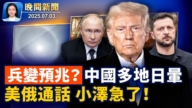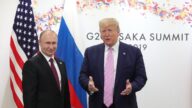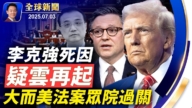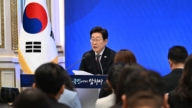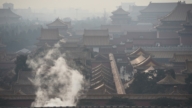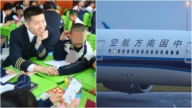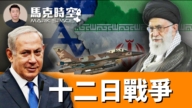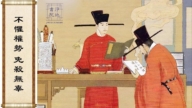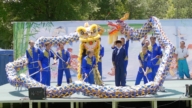【新唐人2014年04月29日讯】美国总统欧巴马即将结束对亚洲四国的访问。他在日本、韩国、马来西亚和菲律宾,都强调了美国对亚太国家的安全保护。舆论形容欧巴马的这次亚洲之行是“不到中国却不忘中国”。这和美国所提到的安保有何联系呢?让我们一起去听听专家们的分析。
28号下午,美国总统欧巴马已经抵达菲律宾,这是他亚洲四国之行的最后一站。美国驻菲律宾大使戈德伯格,在欧巴马到访前几个小时,与菲律宾国防部长盖兹敏,签署了为期10年的《增强防务合作协议》。
这项协议允许美军临时使用多个菲律宾军营,由此得以调遣战斗机和军舰。协议制定了美国军队及军舰、战斗机等设备,轮换进驻菲律宾军事基地的框架。美方强调,这项加强防卫合作的协议将促进地区的和平与安全。
在欧巴马亚洲行的前三站,美国与日本、韩国和马来西亚,也就战略伙伴合作关系、以及国防安全合作、海上安全等广泛交换了意见。美国《纽约时报》评论欧巴马此行是“不到中国却不忘中国”。
美国《中国事务》杂志总编辑伍凡:“第一个就是要联合他的盟国,来抑制中共的扩张。第二个信号:用武力,同盟也好,联盟也好,增加兵力,来防止战争。特别在日本钓鱼岛,一定要用和平方式、外交方式谈判,但是又要支持日本,让它放心跟中国打交道。”
据了解,美国白宫已经命令国防部调整全球的军力部署,把60%的美国海军放到了太平洋地区。英国《星期日泰晤士报》评价美菲合作协议的主旨是:“在直白的警告中国,不要在该地区动武”。“英国广播公司《BBC》”也报导说,“欧巴马此行的主要目地似乎是向亚太盟国保证,美国将坚决支持他们对抗中国(中共)日益频繁的霸凌行为”。
伍凡:“从宏观上来看,美国要重返亚太,战略再平衡。它远离亚太,所以它这里一定要有补给基地,要有盟友。尤其对菲律宾,建立了十年的防卫协定。都是为了要战略上要防止发生战争,来抑制中共的扩张。”
美国2009年高调提出“重返亚太”的国际战略,2011年又宣布“亚太再平衡”政策,这次欧巴马四国之行可以说是“补访”亚洲。
旅美中国问题评论人士李善鉴认为,美国这次一定程度上是让亚州一些国家底气足一些,但实质上,让这些国家能获得期望的和平环境,却在于认清中共极权的危害。
旅美中国问题评论人士李善鉴:“真正让他自己国家能够有一个和平的环境,真正不受威胁,那其实他们就是应该对中共这个政权有一个根本认识。任何一个极权国家都是对整个世界和平的一个威胁。”
中共最高领导人习近平近期多次提到所谓“反恐”。外界普遍认为,中共在2012年因“王薄事件”的冲击,前任党魁江泽民派系故意激化中国与东亚和南亚各国的关系,企图利用“民族主义”情绪,来转移民间的视线。
伍凡:“它现在国内困境非常严重,有11个安全问题。在这种状况下他还能打仗吗?那不是死得更快吗?!它只能用提出民族主义、爱国主义,来转移社会矛盾,口号要时刻准备打仗,要强军。不这样讲的话,那共产党内也好、外也好,全输光了。”
李善鉴:“中共为了自身的生存,需要这些矛盾,那么对于生命、和平是无所谓。中共的统治史就是习惯性使用暴力的历史。所以真正的想彻底的解决这些问题,它其实应该在整个道义上,在意识形态上,有一个非常一致的、非常坚定的立场。”
欧巴马亚洲行来到的最后一站——菲律宾,在亚太地区国家里,海军实力最弱,却和中共在资源丰富的南中国海长期存在主权纠纷,2012年,两国曾在黄岩礁,也称“斯卡伯勒礁”的海域上,对峙长达一个月,局势相当紧张。
采访编辑/唐音 后制/陈建铭
Obama’s Asia Trip: Keeping A Watchful Eye on China
Before U.S. President Barack Obama’s Asia tour draws to an
end, he has stressed again about U.S. support for Pacific Rim
security in Japan, South Korea, Malaysia and The Philippines.
Media report that Obama’s trip has avoided
China, but he is keeping his eye on China.
What is the U.S relationship with security
in the region? Let’s hear experts’ analysis.
On April 28, the U.S. Ambassador Philip Goldberg, and
The Philippines Defense Secretary Voltaire Gazmin signed
a 10-year Enhanced Defense Cooperation Agreement.
This was shortly before Obama’s
arrival in the country on Monday.
This military agreement will give U.S forces
temporary access to selected military camps.
It will allow them to preposition fighter jets and ships.
It will give U.S military a greater access to bases
in The Philippines, and promote peace and stability.
As President Obama has traveled from Japan to
South Korea and Malaysia, he has delivered a message.
This is to reassure America’s friends of its support
and of national security defense and maritime safety.
The New York Times reported that he iss on a trip
that avoids Beijing, but he is keeping his eye on China.
Chris Wu, Editor-in-Chief, China Affairs magazine:
“He is the first one to unite his allies to restrict
the expansion of the Chinese Communist Party.
The second factor is to send a signal
through the military coalition to avoid a war.
It is to encourage Japan to conduct peaceful dialogue with
China, especially on the issue of the disputed Diaoyu Islands."
It is said that the White House has deployed
60% of US marine forces to the Pacific region.
The Sunday Times reported Obama’s military
agreement is “sending a blunt warning to
China against the use of force in the region."
The New York Times also reported that the message
is to discourage “the Chinese from any thoughts
of opening a second front on the Pacific Rim.”
Wu Fan: “From a macro point of view, the United States
is to return to Asia, to re-adjust the Asia-Pacific strategy.
It needs a supply base in the Pacific region
because of the distances, and for it’s allies.
The 10-year military agreement is to
strategically prevent a war from happening.
It will limit the expansion of
the CCP forces in the region."
Since the U.S. foreign policy of returning to Asia was
highlighted by Obama in 2009, and these policies were
futher rebalanced in Asia in 2011, President Obama’s
Asia trip that time has built upon these foundations.
Commentator Li Shanjian believes the gesture is
to give encouragement to some countries in Asia.
However, he analyzes that true peace for these
countries will only be realized after the damage of
the Communist totalitarian system is fully recognized.
Li Shanjian, commentator: “Real peace and freedom
from threats demands a fundamental recognition
of what the Chinese Communist regime is about.
Any totalitarian state is a threat to peace in the world."
CCP leader Xi Jinping has mentioned a number
of times about fighting domestic terrorists’ attacks.
People believe these are incidents manipulated by former
leader Jiang Zemin and his faction, to deliberately intensify
the relationship between China and other Asian countries.
This is in an attempt to take advantage of nationalist
emotions, and divert attention and relieve the impact
caused by the Bo Xilai and Wang Lijun cases.
Chris Wu: “China is now faced with
many domestic security difficulties.
How can it engage in any war? It is doomed to end soon.
That’s why it has been utilizing nationalism and
patriotism to transfer its interntal social conflicts.
It is just a slogan, to go to war, to fight, before its final death."
Li Shanjian: “The CCP has survived on conflict
They don’t care about people’s lives or peace.
The history of the CCP is the habitual engagement in violence.
Therefore, to these countries that desire resolution, they need
to have a firm and consistent stance in ideology and morals."
With its anemic military, The Philippines has struggled to
bolster its territorial defense amid China’s increasingly
assertive behavior in the oil- and gas-rich South China Sea.
Obama flew over “the sea" on his way “to The
Philippines", according to Air Force One cockpit.
Chinese paramilitary ships took effective control of the
disputed Scarborough Shoal, a rich fishing ground off
the northwestern Philippines, in 2012, reported AP.
Post-Production/TangYin Post-Production/Chen Jianming


